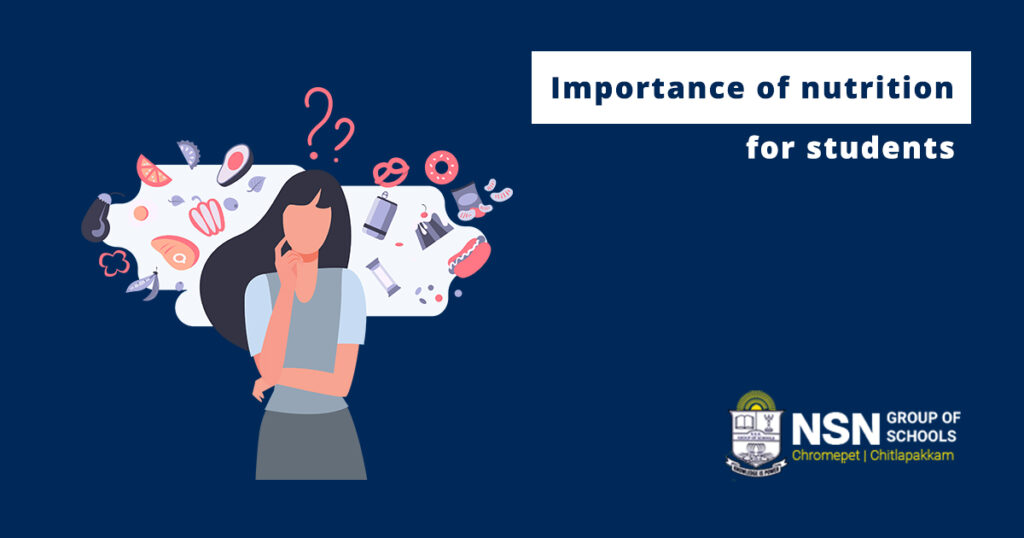
A good, nutritious diet is an important factor in children’s growth and development. It assists in the development of a firm foundation in the child in terms of remaining healthy and instilling excellent food patterns from childhood. The three most essential advantages of early childhood nutrition are that it aids in the establishment of immunity against numerous infectious illnesses, promotes healthy brain and other key organ development, and increases a child’s activity levels and cognitive performance. As a result, adequate nutrition for children is critical since it lays the groundwork for them to have a complete and nutritious existence for the rest of their lives. Now, let’s dive deeper into the subject and take a brief look at the importance of nutrition for students.
The direct relation of nutrition to brain function
Numerous studies have found that dietary status has a direct impact on mental ability in school-aged kids. Iron deficiency, for example, can reduce dopamine transmission, affecting cognition even in the early stages. Other mineral and vitamin deficiencies, notably thiamine, vitamin E, vitamin B, iodine, and zinc, have been proven to impair cognitive ability and mental attention. Supplementing with amino acids in the diet can also help with perception, intuition, and thinking. A number of studies have also shown that nutritional intake improvements can impact the cognitive capacity and IQ levels of school-aged kids.
A well-balanced diet for improved behavior and learning environments
Students who eat well arrive at school ready to study. Because a better diet makes students healthier, they are more likely to miss fewer classes and attend them more regularly. According to research, hunger causes behavioral issues, and sugar has a detrimental influence on child behavior. These impacts, however, can be mitigated if kids consume a well-balanced diet rich in proteins, fat, complex carbohydrates, and fiber. As a result, kids will have more time in class and fewer disruptions to their studies throughout the school year. Furthermore, kids’ conduct may strengthen and cause fewer disturbances in the classroom, resulting in a better educational environment for all kids in the class.
Improve diet quality for better school outcomes
Sociologists and economists have studied the influence of a student’s food and nutrition on academic and behavioral results more closely. Researchers often discover that a higher quality diet is connected with better exam performance and that programs aimed at improving students’ health also show benefits in kids’ academic test scores. It is also the responsibility of schools to educate children about nutrition. NSN Schools promote healthy eating among children and advise them to stay away from junk foods. According to other research, boosting the quality of kids’ meals leads to them being good at every task, higher arithmetic test scores, probably higher reading test scores, and higher attendance.

Rainbow of healthy foods
There is a saying, “Eat more rainbow”, that many dietitians use to advise people to eat more fruits and vegetables. Naturally colored foods, such as blueberries and red bell peppers, include antioxidants, vitamins, fiber, and a variety of other nutrients that promote healthy growth and aid in the prevention of conditions such as obesity, tooth cavities, iron deficiency, and osteoporosis. Yellow and orange fruits and vegetables, for example, are high in vitamins C and A, which help to prevent cell damage, maintain healthy joints and vision, and decrease cholesterol. Green fruits and vegetables, such as spinach, asparagus, and avocado, are strong in vitamins K, B, and E, which help in digestion and promotes bone health. Purple fruit is abundant in vitamins C and K, which aid memory and boost the immune system.
Make certain that your child eats a healthy diet
Without help, direction, instruction, and routine, it may be difficult to guarantee your child is eating healthy and keeping fit. As children get older, they begin to establish ideas about what tastes good to them and what does not. This may not always match what is nutritionally ideal for them. Children can be choosy, avoidant, and obstinate at times. Given that children are very perceptive beings, it is important to generate pleasant and healthy experiences for them. Involving children in meal preparation and choosing may also be a valuable learning technique. It might be beneficial to engage your child’s assistance in selecting foods based on nutritional content and explaining how they can benefit developing bodies whether you’re at the grocery store or even in your own refrigerator at home. Parents are also recommended to use specified serving sizes and to demonstrate to their children the equivalents. This nutrition education may help youngsters comprehend and execute proper portion sizes as they get older, as well as maintain healthy eating habits.
Conclusion
Without sufficient nourishment, a child’s healthy growth is incomplete. Once a kid understands the value of excellent nutrition, she or he will be able to guide him or her to live a pleasant, happy, and sustainable lifestyle. Poor nutrition in a child’s life can also result in stunted growth, which is linked to impaired cognitive ability and poor classroom performance and quality of work. Now, with the help of this article, you know the importance of nutrition for children. Your children require sufficient nutrition to remain healthy and strong as they develop.
